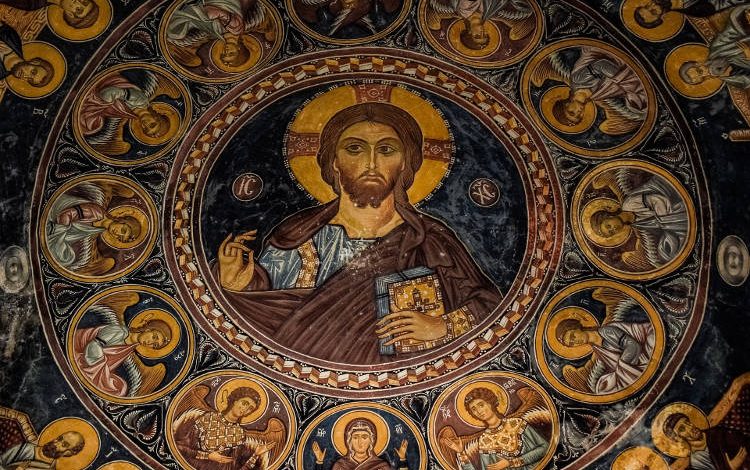
The Divine Liturgy begins with the Priest chanting: "Blessed is the kingdom of the Father and of the Son and of the Holy Spirit...", while raising the Holy Gospel above the Holy Altar and making with it the sign of the Cross.
Why does the Divine Liturgy begin with this particular doxology, which praises the "Kingdom of the Father and of the Son and of the Holy Spirit," and not God Himself? Let us take a brief look at what the Holy Fathers of the Church have said about this, as they have been deeply immersed in the interpretation of the Divine Liturgy since the 2nd century.
The Divine Liturgy is the visible manifestation of the Kingdom of God in our world. As we approach the Holy Altar, the living presence of the King of all is tangible. He sits with His Father on the royal throne and through the Holy Spirit the Mystery of the Church is offered for the salvation of the world. He is present with all of His faithful children and is in communion with them. In the Divine Liturgy, this presence of Christ transforms earth into heaven. The church where the faithful gather to thank and worship the Lord is the place of angels and archangels, the very Kingdom of God, heaven itself! The incarnation of the Son of God opened the door to the Kingdom, and as the Lord says: "The Kingdom of God has come" (Matthew 12:28). Those who participate in the Divine Liturgy move towards the Kingdom, which has already been revealed. Together with Christ, they will drink the new wine, filled with joy and longing for the Kingdom of God. With eyes turned towards this final destination, their hearts burst into praising the Kingdom of the Triune God, the Father and the Son and the Holy Spirit.
Thus, the first words of our worship of God are words of praise fit for this sacred moment. Among the four different types of prayer (praise, thanksgiving, confession and request), praise is the highest of all. St. Nicholas Kabasilas writes: The one who asks wishes to increase something. He who confesses wishes to get rid of the evil for which he blames himself. He who thanks is obviously happy for the good things he has and thanks the one who gave them to him. But he who praises God, having set aside himself, praises the Lord because He is the Lord, powerful and glorious (Interpretation of the Divine Liturgy). After all, only when we sense the infinite power and majesty of God, reflecting on the wonderful things He does, then the soul is flooded with feelings of admiration and wonder. Spontaneous praises of God spring naturally from this.
Of course, the other three types of prayer, which we mentioned, have their place both in our personal prayers and in the Divine Liturgy. That is why in the Divine Liturgy praise alternates with thanksgiving, confession and petitions. In the Divine Liturgy there are a series of complete prayers for the whole world, for all of our spiritual and physical needs, for the forgiveness of our sins, and thanksgiving for God’s innumerable gifts. The more we progress in the spiritual life, the more we will know the goodness, compassion and charity of God! How then can we remain unmoved, and not rush to thank Him! When we think that despite our many sins and disobedience towards God’s will, the Lord does not turn away, but awaits our repentance, we are compelled to heed the words of the Prophet Isaiah: Put Me in remembrance; Let us contend together; State your case, that you may be acquitted. (Isaiah 43:26). When it comes to our requests to God, we come to Him in our sorrow and sense of unworthiness, asking for His protection, support, and help. We do so, drawing strength and courage from the words of our Lord: "Ask, and it will be given to you; seek, and you will find; knock, and it will be opened to you. Or what man is there of you, whom if his son ask bread, will he give him a stone? Or if he asks a fish, will he give him a serpent?" (Matthew 7: 7, 9,10). And the Lord comes to the unshakable conclusion: "If you then, being evil, know how to give good gifts to your children, how much more will your Father who is in heaven give good things to those who ask Him! (verse 11).
The Divine Liturgy therefore constitutes the most complete Service of the Church. We can say that there is no spiritual or physical need, present or future, that is not alluded to in the prayers, requests and hymns of the Divine Liturgy. The whole Divine Liturgy is adorned with praises to the Triune God, from the very beginning to the Dismissal.
The doxology prayed by the priest is sealed by the faithful, who respond with the "Amen". This word is of Jewish origin. With "Amen" we express the wish and desire for what has been said to come true. In short: "May it be done". Believers, when offering the "Amen", accept and preach the truth contained in what the celebrant has said. That is to say, they wish to taste the good things of the Kingdom. With the wholehearted participation of the people, the priestly blessing now ascends firmly to the heavenly Altar. Amen.





